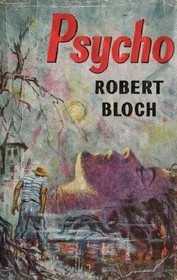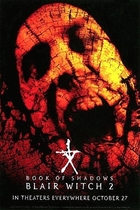Our editor-in-chief Nate Yapp is proud to have contributed to the new book Hidden Horror: A Celebration of 101 Underrated and Overlooked Fright Flicks, edited by Aaron Christensen. Another contributors include Anthony Timpone, B.J. Colangelo, Dave Alexander, Classic-Horror.com's own Robert C. Ring and John W. Bowen. Pick up a copy today from Amazon.com!
Cold Reads: Psycho by Robert Bloch
When Classic-Horror.com returns from its hiatus in May, we'll be featuring a number of regular columns tracking different aspects of the horror genre. Here's a preview of one such column, Jose Cruz's study of horror in literature, Cold Reads.
"Norman Bates heard the noise and a shock went through him." And so begins this timeless tale, a story that is guaranteed to send a few jolts of nervousness through your veins as well. Overshadowed by its celluloid counterpart, Psycho the book has all the creeping chills of the movie along with the great privilege of having Mr. Robert Bloch to guide us through the long, dark corridors of both the Bates house and the minds of its inhabitants.
The plot of the film, for those who have seen it, is fairly the same as the novel: Mary Crane steals a whopping $40,000 from her employer and hightails it out of town so that she can aid her fiancée Sam Loomis with his debts and have a hasty wedding. Finding she has made a wrong turn, Mary pulls into the Bates Motel along a deserted road as a storm rages. Norman Bates, the proprietor of the hotel who lives in a house behind the inn with his little old mom, offers the weary traveler a room and a bite to eat. Norman seems a bit odd, but he's sweet as pie compared to Mother. You see, Mother doesn't like her son talking to women. And she's just a little odd herself. So she decides to fix Mary just as she's enjoying a nice, relaxing shower...
Some may think that since they've already seen the movie that there's no logical reason to bother reading the book. But both are magnificent in their own ways and are staples of their respective mediums. With the advantage of the written word, we are introduced to the thoughts of the characters, adding a layer of rich complexity and depth to them that hardly any film can duplicate. And Bloch does not disappoint in this department. We watch as Mary becomes conflicted with her decision, weighing the pros and cons of committing a serious crime and trying to figure out just what to do next. She is completely human; one minute she has everything figured out and confident in her choices but then becomes doubtful of herself and confused. Her younger sister Lila is a strong force as well. Her desperation and frustration at all the dominant men in her life (Sam, Arbogast, Sheriff Chambers) who hold her back from finding her sister makes her all the more real to us; she's ends up being the most sympathetic character in the story. The aforementioned alpha males are drawn more thinly, more like caricatures (the brave but somewhat befuddled hero, the tough cop, and the crusty old lawman) than fully fleshed out characters. The parts including Sam and Chambers (Arbogast's hardboiled banter is too much fun) really drag and weigh the book down, especially when Sam hands out his "cracker-barrel philosophy" as Lila calls it. However, Bloch's greatest and most intriguing characterization lies in Norman Bates.
It should be noted that the version of Norman from the novel differs from the way he was portrayed by Anthony Perkins; young, handsome, and just a little too quirky. Bloch's version of the character has Norman as a middle-aged, overweight alcoholic who has a deep fascination with strange psychology and the occult. Basically, he's the poster child for lonely, psychotic murderers. This may seem a superficial note at first, but this rendering of the character actually adds a whole new depth to Norman's psychosis. He finds himself unappealing and unattractive, constantly finding fault within his appearance and his personality. It's this self-inflicted emotional abuse that seems to drive Norman to adopt other personalities so that he can become somebody (in his eyes) more favorable. Speaking of which, I don't know about you, but I find it much more frightening to imagine a fat, dirty old man Norman Bates in a dress and wig, complete with powder and rouge makeup, than Perkins' slip-of-a-youth transvestite. The image is sure to give you the chills just by thinking about it.
The way in which Bloch writes the inner monologues (or should I say dialogues?) that Norman has is also enticing. Norman seamlessly changes from one persona to the next and the reader will find themselves nodding along as if it all makes sense. You want to root for Norman when he begins to have thoughts of rebelling against his mother, but time and again you become disappointed when he sinks back into his little boy phase. This infant regression is another facet of the character that is explored more deeply in the novel. Norman makes many references to wanting to hide under his bed covers and find comfort in his Mother's lap when danger is near. One can't help but think that the Bates house, with all of Norman's childhood comforts still intact, serves as a womb for his boy-persona, protecting him from all the "bad things" out in the dark. Instead of just the two struggling personalities that Norman was suffering from in the film, a third one is added to the mix, creating a warped and disturbed "family" all inhabiting the brain of one man (at the end of the book, in true Bloch wit, Sam refers to these three characters as Norman, Norma, and Normal). This new layer of Norman's character elicits sympathy from us and makes us feel sorry for him. You know, the same way we felt sorry for Cujo.
Everything else about Psycho simply shines. Bloch started his writing career doing stories for the pulps and it's quite evident in here. Arbogast seems like a detective straight out of Black Mask and the scenes with all the dirty details of sex and violence reflect back on the trashier mystery magazines of the day. Bloch also exercises his amazing talent for black humor and a few of his dark lines will have you laughing out loud. In particular, I enjoyed when Norman was miserably reminiscing on the night of poor Mary's death: "If he hadn't peeked, if he hadn't been drinking-- No sense crying over spilt milk, though. Even if it hadn't been milk." It's these little snippets of graveyard humor that offset the eeriness and macabre goings-on in the book, only highlighting them in an even ghastlier shade. All in all, a simply amazing piece of horror literature that should not be missed by any true fan of the genre. You must be warned though; the book just may leave you feeling a little dirty.. May I suggest a shower?









Wow, I really enjoyed this
Wow, I really enjoyed this snippet of Psycho told through someone else's point of view. I never actually knew what the actual story was about, other than the fact that there was the classic shower scene. Getting a little deeper insight has helped me come to find that I might actually enjoy reading this book. Jose got one thing right when he said the book and the movie are never the same due to their own uniqueness. I'll definately give this book a try =] Good job
It made me laugh, I really
It made me laugh, I really liked it! The concept of "a fat, dirty old man Norman Bates in a dress and wig, complete with powder and rouge makeup, than Perkins' slip-of-a-youth transvestite" is indeed extremely terrifying! Can't wait for the next one... ^^
It's great to read about
It's great to read about books! Is THE HAUNTING OF HILL HOUSE next?
Annie: Glad to see your
Annie: Glad to see your enthusiasm! Hopefully my future reviews will continue to tickle people's funny bone. =)
Phil: Shirley Jackson's novel is indeed on my to-do list and, if all goes as planned, it should be hitting the site sometime in January 2011. Sorry for the long wait, but I hope you enjoy all the ones in between!
-Jose Cruz
Nice post. As a fan of the
Nice post. As a fan of the movie I can't believe I've never gotten around to reading the book!
The problem I have with the
The problem I have with the novel is that it cheats (Norman having conversations with his mother). Not a bad book by any means, but this is the rare case of the movie being far better than the book.
The Astounding B Monster
The Astounding B Monster website has an article by Tom Weaver which talks about the possibility that Norman Bates in Robert Bloch’s novel “Psycho” was, in part, based on Castle of Frankenstein magazine publisher-editor Calvin Thomas Beck. While I have never read the novel, Weaver compares the mother obsessed Norman with Beck and his domineering mother. Quoting Noël Carter, wife of renowned fantasy-SF writer Linwood Carter, Weaver writes:
"When I met Lin, we saw all the Hitchcock retrospectives and were avid Hitchcock fans. I told him how much I liked Psycho, and he told me the story that, when Robert Bloch was part of this group, Bloch got the idea for Psycho and he based it on two characters. One was the Wisconsin murderer Ed Gein, who killed women and hung up their eviscerated bodies. Ed Gein is the one everybody knows about. But Norman was also based on Calvin Thomas Beck and his mother.”
While there are some who were interviewed for this article that disagree, the majority seem to feel that Beck had a strong influence on the “Psycho” character.
Paul
Very interesting bit of
Very interesting bit of trivia you got there, Paul! I'll have to read that article myself to find out some more about that. Thanks for sharing!
-Jose Cruz
Your review is extremely
Your review is extremely informative because of your vast knowledge of the genre, and remarkably entertaining account of your wonderful sense of humor that oozes along just out of sight, except for those instances that it erupts unexpectantly. I thought that I knew Old Norman pretty well until you clarified his personality and characteristics from the book. I am eagerly, yet patiently anticipating your next project. Keep up the great work!
My favorite line from the
My favorite line from the book is:
"He wondered what kind of girl she was. What was she like inside..."